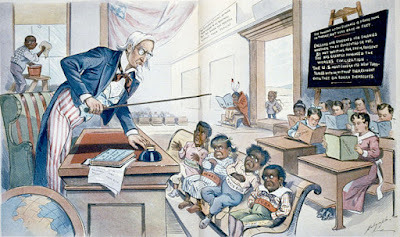Stephen Roney's Blog, page 186
September 5, 2021
American Cultural Hegemony

Folks on the left in many lands, including Canada, loudly lament about cultural imperialism and the “hegemony” of American culture.
This is nonsensical.
They also lament about “cultural appropriation,” of course. Which is to say, if someone else assimilates American culture, Americans are doing something wrong. But if Americans assimilate another’s culture, Americans are doing something wrong. Only Americans seem to have free will.
What is culture? It is a collection of tools for living; systems for creating the best possible life for a group of people.
If you went to the hardware store to buy a tool, what would be the most important consideration? Would it be whether it was made in your home town?
In principle, everyone on earth should have more or less the same culture, apart from what is dictated by varying local conditions: the best of everything. If they do not, it is only because of lack of communication, lack of initiative, and prejudice.
What is American culture?
Because it is a nation of immigrants, the United States has been able to pick and choose the best tools from many parts of the world.
When you think of American culture, what do you think of? Aside from works of individual genius, you think of pop music, with its heavy rhythms, jazz music with its improvisational style; hot dogs, hamburgers, ketchup, pizza; cowboys and the romance of the West; and the democratic ideal.
The rhythms of pop and the improvisation of jazz are from Africa, mixing with Irish and other European traditions. Hot dogs and hamburgers are German; pizza is Italian; chili is Mexican; ketchup is from Indonesia. Cowboys are from Mexican/Spanish culture, with a mix of native Indian traits; the word “cowboy” is a translation from Spanish.
The same is true, to just about the same extent, for the same reason, of Canadian or Australian culture. It is also true of British culture—not due to immigration, but because England is a nation of traders, who went out into the four corners of the world and brought back whatever they found useful. Tea from China, curry from India, potatoes from the New World.
In the end, of course, not least because they share this openness to the world and to new things, the UK, Canada, the USA, and Australia are not really separate cultures. The differences are trivial, and are diminishing daily with improving communications.
The three things we might claim to be the distinctive contribution of the Anglosphere, not imported from elsewhere, are the concept of liberal democracy, the mechanisms to produce it, and the doctrine of human rights, one the one hand, which have deep roots but owe a great debt to John Locke; the concept of the free market mechanism and free market liberalism, which again has earlier roots, but is largely from Adam Smith; and empirical science, which we owe to Francis Bacon and Isaac Newton.
I do not think there is anything wrong, frankly, with foisting human rights, democracy, free markets, or science, on anyone. These are simply the best tools available. Not being of English ancestry myself, I do not feel oppressed by them. Frankly, I would feel oppressed by not having them.
What we have here is not “American culture,” but an expanding world culture. Its lingua franca is English, but other elements can come from anywhere.
A world culture must have a lingua franca. Language is a tool to communicate. The best language is self-evidently that which has the most speakers; and we should all desire and promote one world language.
As our communication improves, we are seeing our world culture enriched by more elements from more lands. Fifty years ago, it would not have included anime, or chicken tikka masala, or K-pop, or tacos. Now everyone knows them, from Saudi Arabia to Santiago.
To worry about the loss of other cultural elements is regressive. If a thing is abandoned, it is probably because it could not compete with something better; and because people freely chose against it. This is a little thing called progress. Adam Smith, John Locke, or Francis Bacon could explain.
'Od's Blog: Catholic comments on the passing parade.
September 4, 2021
The Price of Eggs in China
A longtime YouTuber on China reports an article highlighted in the official Chinese press. The Chinese government is cracking down on big corporations, big names in the entertainment industry, and Western cultural influences. They are calling for a second Cultural Revolution.
This sounds grim--not least, in economic terms. The first Cultural Revolution did not exactly lead to prosperity. Some were reduced to cannibalism.
Andrew Klavan has suggested that the CCP has invented a new form of tyranny, tyranny with prosperity. I doubt that is what is happening here. This sounds to me like desperation. The Xi government is prepared, as Mao was in the 1960s, to sacrifice prosperity to secure and hold power. The CCP fears their hold on the country is tenuous.
The problem with stars of the entertainment industry is that people look up to them, and what they say can have influence. The problem with big corporations is that they are organized, can get things done, and they can get beyond government control.
The CCP fears an alternative government forming.
'Od's Blog: Catholic comments on the passing parade.
September 3, 2021
It's the Herd's Fault

There seems to me to be a certain illogic in the insistent demands, by, for example, Justin Trudeau, that everyone get vaccinated. What is the premise here?
There is probably a legitimate concern that the unvaccinated, if they all get sick, could overload the ICUs and the health system. Fair point—fifteen days to slow the spread. But aren’t the fifteen days up yet?
Beyond that, if the vaccines work, those who are vaccinated need not care whether the next person is vaccinated. If the vaccines do not work, why get vaccinated?
If the failure by many to get vaccinated causes a “fourth wave,” those falling sick are presumably those who have chosen not to get vaccinated. Their bodies, their choice.
This is an oversimplification; the common claim currently is that those who have been vaccinated do run some risk of catching COVID, probably in a mild form. Still, we do not take such extreme measures against the flu or the common cold.
I do not object to vaccine passports. I do not fear they are a wedge to take away our freedoms. Temporary suspensions of basic rights have happened in the past; in war, for example. Our historical experience has been that these do not endure beyond the emergency. In any case, is a vaccine passport really a greater intrusion on one’s rights than a driver’s license?
But do we really need them?
Perhaps the idea is to achieve “herd immunity”: get there, and the virus should die out. Unfortunately, the consensus is apparently growing among top doctors that, with the more virulent strains we now face, herd immunity is no longer possible. If perhaps 70% vaccinated was necessary for the original strain, the Delta variant is perhaps a hundred times more contagious. That puts the herd immunity threshold beyond the realistically possible—and for all we know, a more contagious form is going to appear. Reports are that one has emerged in South Africa that is twice as transmissible as Delta. The very fact that a fourth wave is gathering despite the high levels of vaccination in Canada, the eUK, or Israel tends to demonstrate that “herd immunity” is no longer a viable goal.
My suspicion is that leading politicians are so insistent that everyone get vaccinated because they need a scapegoat for the continuing high number of cases. If they do not focus attention on this scapegoat, people are likely, fairly or unfairly, to start blaming them. I fear they have a tiger by the tail: they cannot leave the restrictions in place forever. Yet they cannot drop all the restrictions and let infection rates rise without people questioning why the restrictions were there in the first place.
'Od's Blog: Catholic comments on the passing parade.
September 2, 2021
If We Don't Mention It, Maybe It Will Go Away
 Joe Biden seeking Americans left in Afghanistan.
Joe Biden seeking Americans left in Afghanistan.Friend Xerxes blames the debacle in Afghanistan on our tendency to use war metaphors: “Whenever America, collectively, decides to act against a perceived threat, they call it a war. War on Poverty. War on Drugs. Even a Peace Corps.” Had the Americans not seen the Taliban as enemies in 2001, all this could have been avoided.
Perhaps he is right on that specific point, the invasion of Afghanistan in 2001. I thought at the time the situation did call for an American incursion, if only to restore American prestige after 9/11. But I would have gone in like the British went into Beijing in the Boxer Rebellion, or into Washington in the War of 1812. Go in there, unseat the government, apprehend and execute a few miscreants, burn down a few symbolic buildings, then withdraw from the rubble. A show of force. The Americans were too ambitious.
Would that have been a war? More like a police action.
I also agree that the War on Poverty was a debacle, and so was the War on Drugs. These are cases in which the metaphor was misapplied. It was punching at shadows. There was no Other there. It was like Conrad’s image of French warships firing randomly at the African coast.
A War on Terror similarly makes no sense. But a War on Terrorists does.
The fact that a metaphor can be misapplied does not discredit the metaphor itself; the fact that a car can be driven into a tree does not demonstrate that cars have no value.
Xerxes here is making a point made popular by Lakoff and Johnson in their influential book Metaphors We Live By back in the 1980s. The same idea was popularized at about the same time as “Neuro-Linguistic Programming” (NLP). The idea is that, by changing the way we express ourselves, we can change our behaviours and change the world.
NLP has been comprehensively debunked; it does not work. It is, after all, a kind of primitive, magical thinking: if we choose to call a red tricycle a pink convertible, we can all afford a pink convertible.
The fact that our euphemisms inevitably come to carry the same undesirable connotations as the original seems to prove the case as well. “Washroom” replaces “toilet” which replaces “privy”: all euphemisms, yet the meaning remains. People still know you are not in there powdering your nose or buying a dog. Trust me. “Person of colour” replaces “black” which replaces “negro,” which replaces “coloured person.” All originally polite; no doubt “darkie” was also properly respectful in its day. “First Nations” replaces “indigenous,” which replaces “aboriginal,” which replaces “native,” which replaces “Indian,” which replaces “redskin”: all originally attempts to be properly respectful. “Exceptional” replaces “challenged” replaces “slow learner” replaces “retarded” replaces “idiot”—all originally euphemisms for stupid. History shows nothing is ever gained by this game of linguistic tag. Wanting to change the term is actually an implied criticism of the person, not the word for it. Wanting to change the term reveals prejudice.
The notion that changing the words can change thinking is also, more ominously, the thesis of Ingsoc in Orwell’s 1984, and the reason they create Newspeak. Were this sort of thing possible, if it is possible, any unscrupulous government or anyone else iin power could practice mind control for their own benefit. We ought to be alarmed at, and energetically resist, any attempt to legislate or restrict vocabulary, even more than we resist efforts to restrict free speech: laws against “hate speech,” mandated pronouns, and the like. It ends as might makes right.
For there is a further philosophical problem faced by Lakoff, Johnson, Xerxes, and their colleagues. If our thinking is radically conditioned by the metaphors we use, how can they suppose their own thinking is not so conditioned? How can they presume that they see things clearly, and so can tell others what to think? There can be no justification, other than the exercise of arbitrary power.
Now as for the specific metaphor of war: it is actually quite useful. While war as such is an undesirable thing, we do need words for undesirable things. It is a sad truth of the fallen universe that it takes two sides to preserve a peace, but only one to start a war. So long as anyone entertains the option of going to war, we all must. Crime is also a bad thing. But if each of us simply decided it did not exist, and disbanded the police forces, would people stop stealing, defrauding, and committing murders? Death is a bad thing. Yet if we dismissed the possibility of death, and closed the morgues and the hospitals, would we have more death, or less?
Denying the usefulness of the concept of war would similarly lead to more war, not less.
The more so in the case of radical Islam, because the radical Islamists do believe they are at war: jihad. So the choice is not up to us; to suppose so is, in a way, the greatest arrogance. It denies human agency to the other. Since they think they are at war, the only way to prevent war is to mount a strong defense.
The same is true, incidentally, in dealing with Marxism. Marxism sees society as an ongoing war between classes, a class struggle. Opting out is not an option; only resistance or submission.
Christianity is perhaps less inclined to use the war metaphor than are many other philosophies and world views. Perhaps that is a strength; perhaps that is a weakness. The Salvation Army has done a great deal of good by applying the metaphor. The Bible does as well, and often; although it specifies that this is not against human opponents:
For our struggle is not against flesh and blood, but against the rulers, against the authorities, against the powers of this dark world and against the spiritual forces of evil in the heavenly realms.
War as war is bad; yet there are worse things than war. Injustice, and passivity in the face of injustice, is worse. For evil to triumph, as Edmund Burke observed, “all that is necessary is for good men to do nothing.” Pacifism is most often a cover for cowardice and selfishness. It would have been immoral not to have gone to war against Hitler, and left the Jews, Czechoslovakia, and Poland to their fate. It would have been immoral not to fight to end slavery in America. It was immoral not to call the police when Kitty Genovese was raped and murdered in a stairwell.
“Therefore put on the full armor of God, so that when the day of evil comes, you may be able to stand your ground, and after you have done everything, to stand.” – Ephesians 6:13.
'Od's Blog: Catholic comments on the passing parade.
September 1, 2021
The Folk Mass Fraud
Many lament that, in possession of the world’s richest musical heritage, the Catholic Church has since the 1970s insisted instead on the “folk mass.”
I love folk music. I resent the term being misapplied here. A folk mass would be great. The music of the modern mass is not folk music.
It is supposed to be. Musicam Sacram, issued in 1967 in the wake of Vatican II, called for “adapting sacred music for those regions which possess a musical tradition of their own.” That was the charter from which this has emerged. And there is a rich North American tradition of sacred music. There is a rich European tradition of sacred music. There is a rich African, African-American, and Caribbean tradition of sacred music. Real folk music is religious. Just pull out any old folk album: the religious element is obvious, and must be a puzzlement or an embarrassment to all the modern lefties who are also folkies. “By the Rivers of Babylon”; “Wayfaring Stranger”; “Go Tell It on the Mountain”; “Will the Circle Be Unbroken.” It’s all either overtly religious or conveys a moral lesson.
But instead of drawing on this tradition directly, new songs were composed hastily by a small body of men, the St. Louis Jesuits. This is by definition the opposite of folk music.
While real folk music is generally emotionally profound, these new songs were Tin Pan Alley superficial.
O city of gladness, now lift up your voice.
Proclaim the good tidings that all may rejoice!
I guess I experienced the height of it when, walking past a church in Syracuse in 1978 or so, I heard the carillon chime out the tune to John Denver’s “Sunshine on My Shoulders.”
Sunshine on my shoulders makes me happy
Sunshine in my eyes can make me cry
Sunshine on the water looks so lovely
Sunshine almost always makes me high
It is all so blandly cheerful. Compare any real folk or gospel song:
Were you there when they crucified my Lord?
Were you there when they crucified my Lord?
Oh, sometimes it causes me to tremble, tremble, tremble.
Were you there when they crucified my Lord?
Or:
I am a poor wayfaring stranger
Travelling through this land of woe.
And there's no sickness, toil or danger
In that bright world to which I go.
Why are we stuck with music at the level of The Archies singing “Sugar, Sugar” in the very presence of the great mystery of the ages? Why did we deliberately reject existing beauty, even against the Vatican recommendation, for mediocrity?
I look up the Canadian Conference of Catholic Bishops’ official Guidelines for Liturgical Music. It quotes, in turn, the General Instruction of the Roman Missal to say “singing is the sign of the heart’s joy.”
Aha. Is it? Anyone who is familiar with folk music, is your typical folk song unrelentingly cheerful? Isn’t there a reason why “the blues” is called “the blues”? For that matter, is your typical piece of classical music? Mendelssohn is generally consigned to the second tier of classical composers precisely because his music is too cheerful.
The bishops continue: “It arises from joy and, if we look closer at it, from love. Singing and making music belong to lovers.” The General Instructions vaguely cites St. Augustine as their authority here, but without quoting him to that effect; and the writings they do cite seem to say nothing like this.
People who see art as no more than entertainment are people who are spiritually shallow. A blues musician would say that they have no soul.
“The foremost reason for all song during the liturgy,” the document goes on to maintain, “is to give praise and thanks to God.” The idea is enshrined in the title of the common Catholic hymnal, Glory and Praise. Happy, happy, joy, joy.
But wasn’t there something in the mass about dying on a cross, about mea maxima culpa, about mercy, about prayers and petitions, about turning from sin, about drinking blood and eating flesh? If the bishops as a body really think the mass is a celebration of all creation as it is, we have a deeper problem than the music.
To be satisfied with the world as it is, with sunshine on your shoulder, to say that we are right now in “the city of gladness,” is the opposite of the Christian message. It is a surrender to the first of the three great temptations, “the world, the flesh, and the devil.” I suspect it is a surrender to all three: what the hallelujah chorus attitude wants most, I suspect, is to deny the existence of sin.
It is a message that would appeal to Dives, not Lazarus.
August 31, 2021
Beauty or Brains?
 Sarasvati
Sarasvati
Many women seem convinced that men do not value intelligence in a woman.
This is obviously wrong. Whether they themselves understand it or not, men are instinctively drawn to the best mother for their children. Since it is of obvious benefit for children to be intelligent, and to have a wise mother to care for and instruct them, intelligence in a woman is always highly valued. As in the classical figures of Athena or Sarasvati or Sophia. Traditionally, to be highly marriageable a woman was expected to be “accomplished”: able to play piano, dance, speak French, recite poetry, and so forth.
So too for almost anything else men favour in the opposite sex: it is whatever is best for children. Youth is valued, because a younger woman is most likely to have the most and most healthy children. Beauty is valued because what we consider beautiful is whatever implies good health. A good strong body will produce more healthy children. A gentle personality is preferred, because gentleness is best around children.
The same is true for the opposite sex: women value in a man whatever suggests the best father.
Why are so many modern women misled on this?
Perhaps women are often poor judges of their own intelligence. Little girls are always told they are wonderful and clever. Eventually, however, if they are not physically attractive, this cannot be hidden from them. As compensation, parents will reassure less attractive girls with some line like “never mind, you are better than those other girls; they may be pretty, but you have more personality. You are more intelligent.” This is a natural dodge, because more difficult to disprove.
School marks might hint otherwise; but modern schools tell everyone they are doing wonderfully. Even when they do not, poor marks may not be as convincing as regular praise.
And in the absence of such trusted feedback from without, the woman herself is unlikely to know: the infamous Dunning-Kruger effect.
Then these less attractive women see the pretty girls getting all the guys, and assume it is because men value beauty over brains.
Not so. Unjust as it may seem, the reality is that attractive people are also likely to be more intelligent: good genes mate with good genes. Even if men value beauty above brains, an intelligent man would stand a better chance of marrying a beautiful woman, and their children would inherit both characteristics.
August 30, 2021
Mirages Seen on the Banks of the Nile
 .. somewhere in sands of the desert
.. somewhere in sands of the desertA shape with lion body and the head of a man...
For many years, something puzzled me: why is it that whatever the majority of people believe is so often the exact opposite of the truth? It seemed so consistent I suspected the existence of some evil intelligence, the Devil, coordinating the many individual opinions.
I think that is true; there is a Devil, and he is behind this. But a personal devil is not a necessary hypothesis to explain this. It is simply a universal law that, once you start to lie or to do wrong, you fear the truth. Since you fear the truth, you want to get as far away from it as possible. A lot of people are up to no good. Not necessarily a majority, but such people are both desperate and unprincipled. That is enough to cow others into obedience. Few people are actively good. Some are actively bad, and most others just go along to get along. So the grossest lies become standard currency.
Some examples:
The common condemnation of the Crusades as a macroaggression on Muslims based on religious prejudice. In fact, the “crusade,” the holy war, was a Muslim invention: jihad. The Christian Crusades were a response in kind, in imitation of the Muslim practice. The Muslims had overrun the Holy Lands and most of the Byzantine Empire; the Byzantine Empire appealed to the rest of the Christian world for help.
The common condemnation of slavery as a peculiarly American, British, or European sin, and a sin against Africa. In fact, slavery was a near-universal practice--except in Christian Europe, where chattel slavery was nonexistent. It was revived in the new European colonies only as a concession to local practice--through contact with slave-holding societies in Africa and the New World. Later, it was a British mission to eliminate slavery throughout the world.
The common notion that Indians/”First Nations” lived in harmony with nature. In fact, they lived in conflict with nature, pillaging for their needs. It is the settled farmers from Europe who husbanded the land, taking out only what they put in.
I go on about the Indians, because I have researched and written a book on the subject…
The common falsehood that the policy of the Canadian government has been to wipe out Indian culture, notably through the residential schools. The way to assimilate Indians, had this ever been the intent, would have been to put them in the public schools. It would have been to evacuate remote reserves and bring them into the towns and cities. In fact, the policy of Canadian governments has always been to preserve Indians as a distinct group, reducing their contact with others like animals in a game preserve. Out of misguided concern.
The common misunderstanding that Canada is built on stolen Indian land. The land was sold by treaty long ago; the aboriginal groups surrendered all claims on the land in return for agreed compensation. And it is worth mentioning that aboriginal title did not exist in the first place, by common law. It was invented as a useful fiction to gain Indian recognition of government authority. According to the philosophy behind the common law, nobody can really own land. God made the land for everyone. One only owns one’s labour, and this may be invested in the land by tilling and sowing, or otherwise improving it. Since the Indians did not work the land, but merely hunted and gathered, they have no more rights to the land than anyone else. They have the same right to purchase or to homestead or to hunt and gather, so long as the latter does not interfere with someone else’s more intensive use of the land.
The common illusion that the land was sacred to the Indians. The Indians were almost all nomadic. No particular area of land would have meant much to them. It means far more to the settled farmer or even city dweller, who may have spent his life on it, who remembers his childhood here, whose loved ones and ancestors may be buried nearby.
The common condemnation of “European colonialism” and “European imperialism.” In fact, almost all countries have been empires until recent times. The European contribution was not to invent imperialism, but to end it. The unique European creation was the ethnic or nation state. The first nation states were England and France, perhaps also Spain, Portugal, and the Netherlands. They spread this concept to the world—through their short-lived “empires.”
The common complaint that Western civilization is Eurocentric, and has too little regard for other cultures. This is easily disproven by the simple fact that “the West” refers to itself as “the West.” It is literally not self-centric. Most cultures usually suppose they are. This has led the West to be unusually outward-looking, to put to sea to explore, and to acquire influences and even people from other cultures.
The common fraudulent claim that the left works for the poor, and the right for big corporations. The left likes lots of regulation on business. This works in favour of big corporations, because it prevents market competition. The left will give some assistance to the very poor, but will ensure that they cannot improve their lot; it makes them permanently poor. Most of the money they claim to raise for “the poor” goes instead into the pockets of wealthy “experts,” who have a vested interest in perpetuating the problems.
If you ever imagined the corporations were on the right, seeing Google, Facebook, Amazon, Patreon, PayPal and Twitter all move as one being to suppress voices on the right has to disprove it.
The common falsehood that women have, throughout history, been oppressed by men. The fact is, men were obliged to go off and work, usually for another, for a living. Women could expect to stay at home and be their own boss. Women were exempted from military service or conscripted labour; men were sent off to be killed. Women were exempted from any dirty, strenuous, or dangerous work, and in many times and places could not be prosecuted for a crime. Growing up, boys are given tough love and hard knocks. Girls are told they are princesses no matter how they behave.
Following in this time-honoured tradition of asserting the opposite of the truth, in recent years racism has been rebranded “anti-racism,” and refusing to see race is now called “racist.”
There are many more such lies.
But the biggest lie of all is that there is no meaning to life, and no good evidence for the existence of God. Nothing could be further from the truth; yet surely it is the general modern consensus. I think of Monty Python’s rambling movie “The Meaning of Life.” ‘Alas!’ we moderns and post-moderns feign to lament. ‘If only we could figure out why we are here.’
Literally everything that exists proves the existence of God. God is the necessary answer to the question, “Why is there something instead of nothing?” What could be more proven?
But wait; there’s more. We have more and stronger logical proofs of the existence of God than of anything else in the universe. Why, other than whistling past the grave yard, this pretense that the matter is in dispute?
And the meaning of life has been well known and accepted across cultures since ancient times, and no doubt before. It is to seek what is true, what is good, and what is beautiful. These qualities are of self-evident value; the value of truth or good or beauty does not need to be justified. Rather, all things are of value to the extent that they are true, or good, or beautiful.
I recently wrote an essay for the national Mensa publication, pointing this out.
No surprise: it prompted an energetic argument. Two members, and counting, felt driven to write articles asserting that life had no meaning.
They made no argument that this was so—they simply asserted it, and claimed I had not proven the opposite. In the process, ignoring my arguments.
My experience is that many people very strongly do not want life to have any meaning.
Especially if that meaning is truth. Truth for many is the great enemy.
It all has to do with a river in Africa.
'Od's Blog: Catholic comments on the passing parade.
August 29, 2021
Redistricting for a New Federalism
Cities have become much larger than they were back in the day when provincial and state boundaries were drawn, and this has created a political problem. City life and city concerns are very different from those of the smaller towns and rural areas. There is a cultural divide. In many territories, the rural and small town vote gets consistently overwhelmed by the big city. That is the very sort of problem that federalism was meant to prevent.
Accordingly, it is time for a general redistricting, establishing really large cities as their own independent provinces and states.
In Canada, Montreal and Toronto-Golden Horseshoe need to be hived off. This would create a better demographic balance with the other provinces as well: Ontario and Quebec have far more people than the others.
In the US, there is rural dissatisfaction in the Pacific states and in Illinois. Chicago, Los Angeles-San Diego, San Francisco-Silicon Valley, and Seattle-Portland could be hived off. In the East, New York City-Long Island could be a separate state.
'Od's Blog: Catholic comments on the passing parade.
The CANZUK Future

The current chaos in Afghanistan offers one more good argument for CANZUK—a formal coalition of Canada, Australia, New Zealand, and the United Kingdom. Britain, Australia, and other nations were trapped by America’s sudden withdrawal. America no longer looks like a reliable ally. Had CANZUK existed, it might have been able to take charge.
CANZUK should also appeal to Britain as a way to stand strong in trade competition with the EU. For Canadians, it elevates them beyond just being America’s eternal kid brother. For New Zealand, the added partners prevent being overmatched by Australia. For Australia, it is protection against China.
It is suddenly looking possible that Erin O’Toole may become Canadian prime minister. If so, CANZUK is an official part of his party’s policy.
'Od's Blog: Catholic comments on the passing parade.
August 28, 2021
The New Apartheid
 Shadd as she appears on Mackenzie House.
Shadd as she appears on Mackenzie House.
 Shadd as she appeared in life.
Shadd as she appeared in life.A new mural has blossomed on the side of historical Mackenzie House in Toronto. It is a portrait of Mary Ann Shadd, the publisher of the Provincial Freeman newspaper (1853 – 1857 or so).
She is being honoured for being black and a woman—the Provincial Freeman was not an early newspaper, but the first in Canada to be published by a black woman.
This in itself seems discriminatory. We should not honour people simply for being the first of their sex or ethnicity to do a thing. That is a textbook case of the soft bigotry of low expectations.
But the way she is portrayed is more troubling—dolled up like a cartoon African Queen. Shadd was a proper Victorian Quaker lady, who dressed accordingly. The three commitments in the banner of her paper were to “anti-slavery, temperance, and general literature.” Temperance at that time did not just mean abstinence from alcohol, but sobriety and moderation in all things—including in personal adornment.
The agenda of the Provincial Freeman was to promote integration and to “develop in Canada a society to deny all assertions regarding the Negro's inability to live with others in civilized society.” This was a major issue of the day, even among strident abolitionists: should all the blacks, if freed, be shipped back to Africa, to Liberia and Sierra Leone, or could they adapt to live among civilized people?
Shadd had previously run a school. She lost her funding because of her adamant insistence on integration, rather than running it, as other prominent blacks preferred, as black-only.
The portrait, in visual terms, takes the side in direct opposition to Shadd, saying she was inalienably alien, and could never fit in.
Next, I expect to see portraits appear of Martin Luther King wearing a leopard skin, carrying an assegai, and with a bone through his nose. Well done, regressives.
'Od's Blog: Catholic comments on the passing parade.



